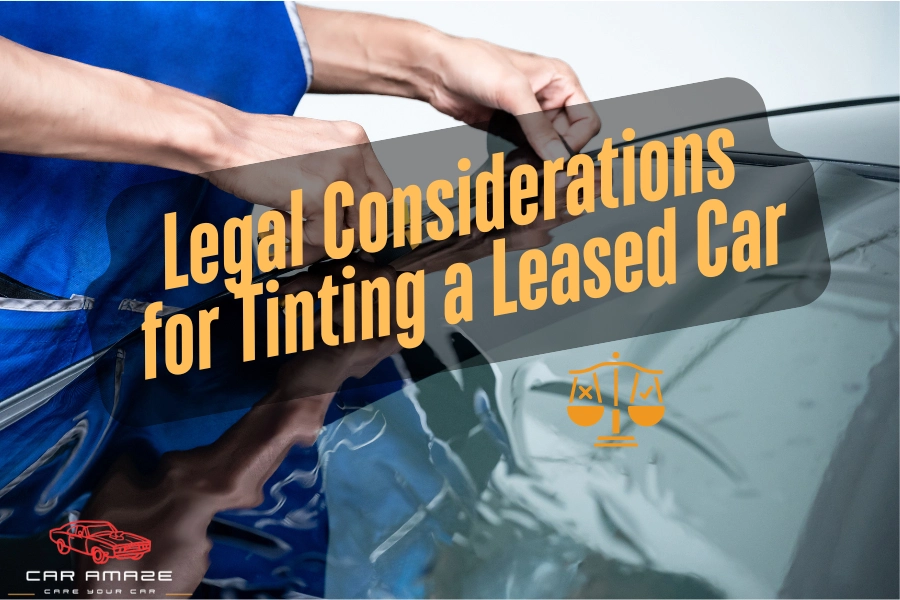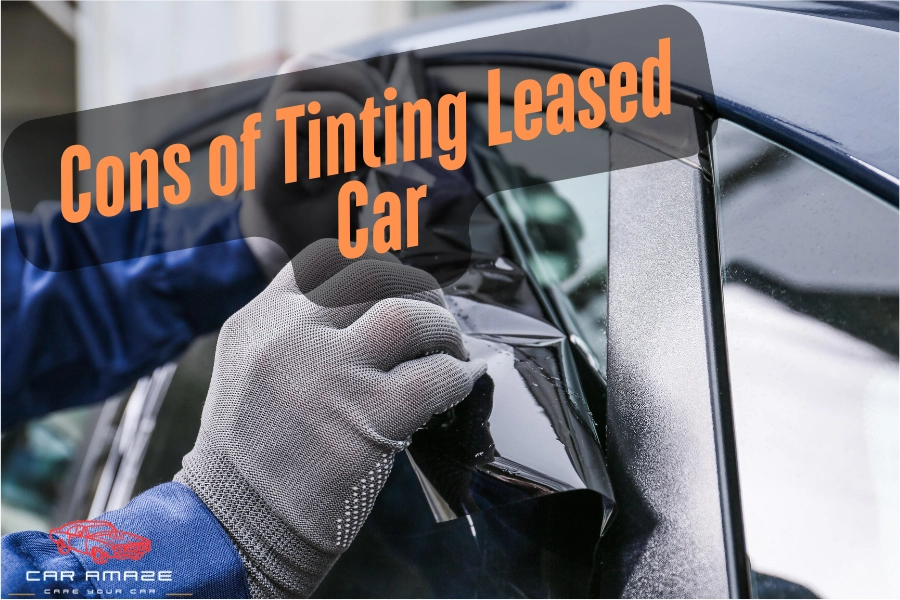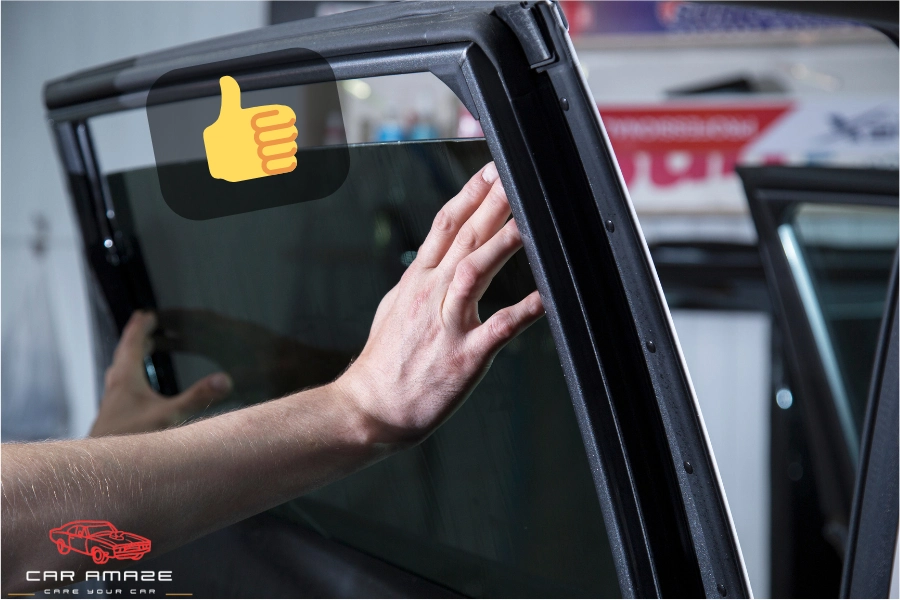Can You Tint a Leased Car? Pros, Cons and Legal Considerations

Most people enjoy tinted windows since they improve the appearance of a vehicle, making it appear slim and stylish without forgetting about additional advantages such as glare and heat reduction. But, can you tint a leased car? Are there any rules on tinting leased cars?
This guide will assist you in understanding if tinting a leased vehicle is permissible, the legality, and the advantages and disadvantages of window tint addition. I will also share expert advice on how to make the correct choice.
Table of contents
- Can You Tint a Leased Car? Quick Answer
- Legal Considerations for Tinting a Leased Car
- Leasing Service Provider Rules about Tinting Car
- Pros of Tinting a Leased Car
- Cons of Tinting a Leased Car
- Expert Tips for Tinting a Leased Car
- Conclusion
- FAQs
Can You Tint a Leased Car? Quick Answer
The response is based on your lease contract and state laws. Some leasing companies permit window tinting, while others do not. Even if your lease does allow tinting, you are still required to comply with state laws on tint darkness and visibility.
If you get a tint that does not abide by your lease conditions, you could get penalized for the return of the car. That’s why it’s crucial to read your lease agreement first before you make any changes.
Key Factors in Your Decision
Prior to making up your mind to tint your leased vehicle, take into account the following points:
- Lease Agreement: Is your lease eligible for modifications such as window tints?
- Local Tint Laws: Every state has varying laws on how dark the windows can be.
- Removal Costs: There might be costs to remove the tint when bringing the car back.
- Manufacturer’s Warranty: A few warranties invalidate if you tamper with the windows.
- Insurance Impact: Visibility can be decreased with dark tints and higher insurance risks involved.
Knowing all these, you can make the right choice of tinting your leased car.
Legal Considerations for Tinting a Leased Car

Can you tint a leased car? Here are some more legal considerations that will clear this concept:
1. Understand Local Tint Laws
Tinting laws vary across states. For example:
- California: Front side windows must allow at least 70% of light to pass through.
- Florida: Front side windows must allow at least 28% light, while rear windows can be darker.
- New York: All side and rear windows must allow at least 70% light.
It’s important to check the laws in your state before tinting your car windows. You can find official regulations on your state’s Department of Motor Vehicles (DMV) website.
2. Legal Consequences of Unauthorized Tinting
If you do not follow legal car tint rules, you could face:
- Fines and Penalties: Some states charge up to $250 per violation.
- Failed Vehicle Inspections: You may not pass the safety checks required for registration renewal.
- Lease Violations: Your leasing company may charge additional fees or refuse to renew your lease.
To avoid these issues, always ensure your tint follows local laws.
3. Insurance and Safety Regulations
Your insurance company can raise premiums or refuse to pay a claim if an accident occurs because of illegal tinting. Darkly tinted windows impair visibility, particularly at night, making them more likely to be involved in accidents. So, you can tint a leased car, but insurers may also demand evidence that your tint is legally required before they cover the damages.
4. Consult Legal Advice for Tinting
If you’re not certain regarding laws in your area or lease provisions, it’s a good idea to get advice. Car salesmen, tinting technicians, or a legal professional can advise you according to your location and the terms of the lease. Therefore, consulting with them is helpful to decide whether you can tint a leased car or not.
5. Federal and Local Law Differences
In the United States and some other countries, there are no federal regulations on car window tinting but only state laws. Nonetheless, if you often travel between states, you must make sure that your tint is in line with the most restrictive state laws within your area.
Leasing Service Provider Rules about Tinting Car
When you rent a vehicle, you are basically leasing it for an extended time. That implies that the leasing company owns the car, and they dictate the regulations on what you can and cannot do to it.
1. Check Your Lease Agreement
Your lease agreement will specifically indicate whether changes such as window tinting are permitted. Some firms will allow it if the tint meets local regulations, while others do not allow any changes at all.

Key things to look for in your lease:
- Are cosmetic changes such as tinting addressed?
- Does it outline any charges for unauthorized changes?
- Are there stipulations for the removal of changes when returning the vehicle?
If your lease does not allow you to tint a leased car, contact your leasing company for an explanation.
2. Dealership and Manufacturer Policies
Even if your lease permits tinting, the auto manufacturer might have its own policy. Some manufacturers provide factory-installed window tint, and installing an aftermarket tint might invalidate your warranty.
Dealerships may also have policies regarding modifications. If you’re leasing through a dealership, ask them whether tinting is permitted and whether it affects the car’s return process.
3. Impact on Lease Renewal or Buyout
If you expect to return your vehicle at the end of the lease, you might have to take out the tint so that you will not be charged additional amounts. If you expect to purchase the vehicle at the end of the lease, the regulations can be more relaxed.
Consider these factors:
- Will the company charge you for the removal of the tint?
- Does the tint diminish the resale value of the car?
- Are there any exemptions for lease-to-own contracts?
4. Know Contract Modification Terms
Most lease contracts state that modifications have to be reversible. This implies that even if you tint a leased car, you might have to put it back to its original state when you return the car.
Look for the following in your contract:
- The expense of reversing modifications
- Fines for irreversible changes
- Limitations on third-party modifications
5. Request Written Approval
If you would like to tint your leased vehicle, always receive written permission from your leasing company first. Oral agreements or assumptions will not shield you if you have disagreements later.
6. Discuss Leasing Company Guidelines
Prior to tinting your leased vehicle, sit down with your leasing company. Some firms can permit tinting, but only with approved installers. Others can demand a special kind of tint that meets warranty and lease conditions.
Pros of Tinting a Leased Car

Tinting your leased vehicle has numerous advantages. If your state laws and lease contract allow you to tint a leased car, the following are some benefits of installing window tint.
1. Enhances Privacy and Security
Tinted windows will make it more difficult for individuals to view what is inside your vehicle, thus safeguarding your property. This is particularly beneficial in urban centers or crowded parking lots where car break-ins are prevalent.
2. Reduces Interior Heat
Window tint can reject as much as 70% of solar heat into your vehicle, keeping the interior cool on hot summer days. This is especially beneficial in states such as Arizona, Texas, and Florida, where high temperatures cause discomfort while driving.
3. Minimizes Glare for Safer Driving
Sun or car headlight glare can pose risks to driving. Tinting helps eliminate glare so that you can drive safely while seeing better during sunrise, sunset, or nighttime.
4. Boosts Car Appearance
A glossy tint can enhance the appearance of your vehicle. Most luxury cars are equipped with factory-installed tints since they improve the entire look of the vehicle.
5. Improves UV Protection
Window tints block as much as 99% of damaging UV rays, which:
- Protects your skin from sun damage
- Prevents interior fading of the car
- Prevents cracking of leather seats
This can assist in preserving the resale worth of your car by preserving the interior.
6. Potential to Lower Energy Costs
Because the coloring prevents overheating within the car, you should be able to use your air conditioning (AC) less. This will, in turn, improve gasoline efficiency in petrol-fueled automobiles and lengthen the battery lifespan of electric-powered automobiles.
7. Increase in Overall Comfort
A cooler interior, less glare, and enhanced privacy all add up to a more pleasant drive. If you get a permit to tint a leased car, you can enjoy your drive and keep yourself safe from heat and UV rays.
Cons of Tinting a Leased Car

While tinting a leased vehicle has numerous advantages, it also has its disadvantages. The following are key points to note before deciding.
1. Risk of Lease Agreement Violations
Most lease agreements heavily prohibit alterations, such as window tinting. If your lease does not allow you to tint a leased car and you proceed with it, you could incur fines, additional charges, or termination of the lease.
2. Possible Additional Costs
Even if tinting is permitted, there are nevertheless expenses to bear in mind, including:
- Cost of professional installation of tint (from $100 to $400 depending on quality).
- Charges of tint removal upon returning the car (from $50 to $150).
- Possible penalties if the tint is not to legal standards.
- One of the common drawbacks is damage to windows after removing tint. You can trade in a damaged financed car, but you will have to cover the damage first.
3. Potential Decrease in Resale Value
Certain leasing companies consider aftermarket tints as cosmetic damage that may reduce the resale value of the car. If the company determines that the tint harms the marketability of the leased car, you might be asked to pay for its removal.
4. Difficulties Removing Tint
Tint removal on a leased car is not always simple. Low-quality tint can:
- Deposit sticky residue, which is hard to remove.
- Damage to defroster lines on rear windows.
- Need professional removal, which is costly.
5. Impact on Warranty and Insurance
Certain manufacturers regard window tinting as an unauthorized alteration, voiding at least part of your warranty. In the event of an accident, if you tint a leased car and it is darker than the permissible limit, your insurance claim may be denied.
6. Limited Tint Options Approved
Even if tinting is permitted, your leasing firm will only authorize certain tint levels or brands. This reduces your options and could increase professional tinting costs.
7. Unexpected Legal Issues
Laws regarding the normal or electric window tint for cars vary by state and nation. If you travel between states, your tint can be legal in one state but illegal in another, with corresponding fines or the need to remove it.
Expert Tips for Tinting a Leased Car
So, can you tint a leased car? Yes, you can, but here are some tips to avoid hassle:
1. How to Get Lessor Approval
Make sure to consult your lease agreement for tinting regulations. Get in touch with your leasing agency and ask them for written consent. A few companies permit tinting with conditions, so knowledge of their rules will save you from lease defaults or fines.
2. Choosing the Right Tint
Selecting the right tint is crucial. Choose ceramic tint or regular tint that last longer and block UV rays effectively. Avoid cheap dyed tints, as they fade quickly and may be difficult to remove, increasing your expenses when returning the car.

3. Installation and Removal Tips
If you get a permit to install tint on a leased car, hire a professional installer. Opt for a non-permanent tint that can be removed easily before returning the car. DIY window tinting can lead to air bubbles, peeling, or uneven tinting, which may result in lease-end penalties.
4. Research Local Tint Experts
Seek out certified tinting technicians who have good reputations. Good installers apply top-quality films that meet state tint regulations. Questioning the warranty coverage guarantees that you receive a long-lasting tint that does not peel or fade with time.
5. Verify Tint Quality Standards
Good-quality tints must be scratch-resistant and must offer a minimum of 99% UV protection. Low-quality tints are known to conflict with GPS, radio signals, or keyless entry systems. Always select a tint that passes safety standards in order to evade technical problems.
6. Understand Warranty Implications
Prior to tinting, determine if it will void your car’s manufacturer warranty. Some manufacturers invalidate warranties when tinting destroys the windows or defrosters. Make sure that your tint company has a warranty that protects against bubbling, peeling, or discoloration.
7. Learn from Real User Experiences
Visit online car forums and customer reviews to know leasing companies’ policies regarding tinting. Some customers have posted experiences regarding the installation and removal of tint, sharing some useful tips on how not to commit typical mistakes.
Conclusion
In short, you can tint a leased car, but it has both benefits and drawbacks. It increases privacy, lowers heat, and enhances comfort, but it can also result in lease infractions, extra expenses, and lawsuits. Always review your lease contract and local regulations before making any alterations. If permitted, use good-quality tints and professional fitting to minimize future issues. Approving it from your leasing firm guarantees compliance and avoids surprise fines.
FAQs
What can you not do to a leased car?
Permanent alterations, excessive wear and tear, and unauthorized work are usually banned under most lease contracts. Such changes as repainting, putting holes in it for accessories, or modifying the body of the car are not typically permitted. Check your lease agreement at all times to stay out of trouble.
Are you allowed to make modifications to a leased car?
Alterations are generally forbidden, but minor, reversible alterations may be permitted on approval. Modifying a leased vehicle without authorization can result in fines or fees when the vehicle is returned. Always contact your leasing organization prior to making modifications.
Can I modify my exhaust on a leased car?
No, you can’t modify an exhaust system on a leased vehicle. The lease deal stipulates that the vehicle should be returned to its original condition. Any exhaust modification may result in additional fees or termination of the lease agreement.
Can you add accessories to a leased car?
Yes, but only temporary accessories such as phone holders, seat covers, or removable floor mats. Always make sure accessories are easy to remove without causing damage.
What is considered a lease modification?
A lease alteration consists of any modifications that change the vehicle from its factory state. This can consist of window tint, aftermarket wheels, exhaust alterations, and bodywork. Reversible alterations may be permitted if removed prior to returning the leased vehicle.








It is the best time to make some plans for the future and it’s time to be happy. I have learn this publish and if I may just I want to recommend you some interesting things or suggestions. Maybe you could write next articles referring to this article. I want to learn more things about it!
Thank you for your thoughtful comment! I’m glad you found the article helpful. I appreciate your suggestions and will definitely consider covering related topics in future posts. Stay tuned!